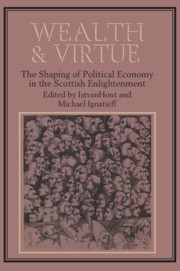Book contents
- Frontmatter
- Contents
- Preface
- List of abbreviations
- 1 Needs and justice in the Wealth of Nations: an introductory essay
- 2 Where had the Scottish economy got to by the third quarter of the eighteenth century?
- 3 Gershom Carmichael and the natural jurisprudence tradition in eighteenth-century Scotland
- 4 The Scottish professoriate and the polite academy, 1720–46
- 5 From applied theology to social analysis: the break between John Locke and the Scottish Enlightenment
- 6 The Scottish Enlightenment at the limits of the civic tradition
- 7 Adam Smith as civic moralist
- 8 The legal needs of a commercial society: the jurisprudence of Lord Kames
- 9 Cambridge paradigms and Scotch philosophers: a study of the relations between the civic humanist and the civil jurisprudential interpretation of eighteenth-century social thought
- 10 Adam Smith's ‘enduring particular result’: a political and cosmopolitan perspective
- 11 The ‘rich country–poor country’ debate in Scottish classical political economy
- 12 John Millar and individualism
- 13 Scottish echoes in eighteenth-century Italy
- Index
2 - Where had the Scottish economy got to by the third quarter of the eighteenth century?
Published online by Cambridge University Press: 05 June 2012
- Frontmatter
- Contents
- Preface
- List of abbreviations
- 1 Needs and justice in the Wealth of Nations: an introductory essay
- 2 Where had the Scottish economy got to by the third quarter of the eighteenth century?
- 3 Gershom Carmichael and the natural jurisprudence tradition in eighteenth-century Scotland
- 4 The Scottish professoriate and the polite academy, 1720–46
- 5 From applied theology to social analysis: the break between John Locke and the Scottish Enlightenment
- 6 The Scottish Enlightenment at the limits of the civic tradition
- 7 Adam Smith as civic moralist
- 8 The legal needs of a commercial society: the jurisprudence of Lord Kames
- 9 Cambridge paradigms and Scotch philosophers: a study of the relations between the civic humanist and the civil jurisprudential interpretation of eighteenth-century social thought
- 10 Adam Smith's ‘enduring particular result’: a political and cosmopolitan perspective
- 11 The ‘rich country–poor country’ debate in Scottish classical political economy
- 12 John Millar and individualism
- 13 Scottish echoes in eighteenth-century Italy
- Index
Summary
The purpose of this essay is to delineate the economic position of Scotland immediately prior to the publication of the first books of the Wealth of Nations in 1776 and to inquire to what extent Scotland in this period was experiencing growth, who (if anyone) was becoming richer, and how was it coming about. To pose these questions in a book of this nature is not to imply that the early Scottish political economists were really writing about Scotland (or mainly about Scotland) when they proposed general models. But it would be wilful not to recognize that part of their intellectual equipment was the experience of the contemporary Scottish economy and recent economic history, and that if we want to understand them it may help to understand this experience also.
It is appropriate to begin by considering the seventy-five years or so that preceded 1750. The conventional picture of this period is one of deep stagnation in which very little economic growth or benevolent change occurred. On the one hand, in the late seventeenth century the economy had been bedevilled by commercial crisis in overseas export markets and by famines which were themselves indicators both of a relatively backward and stagnant agriculture and of the inability of the country to earn sufficient foreign exchange to import enough food to cover a shortfall.
- Type
- Chapter
- Information
- Wealth and VirtueThe Shaping of Political Economy in the Scottish Enlightenment, pp. 45 - 72Publisher: Cambridge University PressPrint publication year: 1983
- 14
- Cited by

